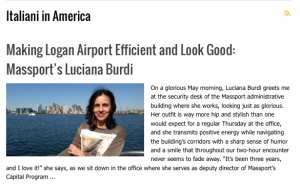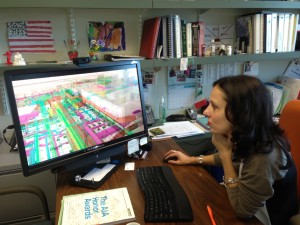 On a glorious May morning, Luciana Burdi greets me at the security desk of the Massport administrative building where she works, looking just as glorious. Her outfit is way more hip and stylish than one would expect for a regular Thursday at the office, and she transmits positive energy while navigating the building’s corridors with a sharp sense of humor and a smile that throughout our two-hour encounter never seems to fade away.
On a glorious May morning, Luciana Burdi greets me at the security desk of the Massport administrative building where she works, looking just as glorious. Her outfit is way more hip and stylish than one would expect for a regular Thursday at the office, and she transmits positive energy while navigating the building’s corridors with a sharp sense of humor and a smile that throughout our two-hour encounter never seems to fade away.
“It’s been three years, and I love it!” she says, as we sit down in the office where she serves as deputy director of Massport’s Capital Program and Environmental Affairs Department. Burdi shows a detailed map of Massport property and explains, in non-administrative lingo, that she oversees “the 84 people who basically manage all construction and property budgets for Logan, Worcester and Hanscom field airports as well as the Boston harbor.”
Her office, and the one next to hers occupied by her boss and mentor Sam Sleiman, could not be placed more strategically. The actual bay where most of the activity they lead and monitor can be seen through the windows of this key department of the semi-public authority in charge of air and maritime activity for the entire Bay state (a 31.6 million-passenger affair). With planes constantly flying overhead, in the distance, Boston’s skyline appears in all its steel and glass might and beauty. From where we sit, and with the sun still low, the business district in particular looks its absolute best: in fact, and definitely not by chance, its growth in the past few years has proceeded hand in hand with the enlargement and improvement of Boston’s Logan airport.
“Have you seen what we did to Terminal B?” Luciana asks while taking out maps and pulling up virtual renditions on her enormous computer monitor. She refers to the latest completed project in Massport’s long to-do list: the unification of the two sides of the terminal respectively operated by United (recently moved from Terminal C) and American Airlines. “Look how stylish the seats are. Each one has an outlet to recharge your portable devices,” she continues, with the same passion she could have talking about renovating rooms in her home. “And wait until you see what we do to terminal E.”
The airport is indeed like a second home for Burdi. The fact her interview was scheduled for 7 a.m. is no surprise: that is when her workday usually starts. The early start, though, does not mean early dismissal: “I am never out of here before 6 p.m.,” she explains without a minimal hint of complaint. She obviously loves it here, and most of all she loves her role in making it all work: “An international airport is such a complex machine, with so many variables, some of which are unpredictable by definition. After 9/11, all the added security made it even more difficult to run,” she says while showing me a digital animation of the maze of pipes, belts and luggage screening machines that now have to be factored in when designing an airport building. “In the end, it all comes together. All you need is the right processes. And I love studying processes.”
At that point, she takes from a shelf the final dissertation that earned her a Ph.D. in architecture at Harvard University — a thesis about the processes (bureaucratic, technical, economic) needed to carry out a public building project, from conception to completion. Mazes unfold page after page. This is what she studied, what she has always been fascinated with, and now, after more than ten years of experience in the private sector, exactly what she is doing for a living, on behalf of one of the most important cities in America and, for that matter, the world. There is enough material to explain the unfading smile.
“As much as I love my country, I do not think I could have gone this far if I stayed in Italy,” she says in a matter-of-factly tone. A native of Bari, Burdi knows all too well both what the current Italian economic situation is and how being a woman from the South would have added to the difficulties of pursuing the career she is currently in. For someone with her level of confidence, sentences like “I am good at what I do” or “my colleagues look at me as inspiration to choose outfits and shoes” would probably not land well in a country where excessive modesty whether is often, and unfortunately, regarded as a quality.
Instead of dwelling on all this, she prefers to give credit where — she feels — credit is due: her father Michelangelo (a retired engineer) and late mother Gabriella (a physical education teacher “who worked because she wanted to, not because she had to”) who supported her from the very beginning; her cousins in Chicago, Maria and Vito, “my second family” who hosted her and helped her out when she came to America for what was supposed to be a brief English language learning experience; her cousin Gino who at the right time invited her to join him in Boston; her professional and academic mentors throughout her career, in particular DCamm ex-Commissioner David Perini and Harvard thesis advisor Daniel Schodek; her husband Michael, also an architect from Montana who helps her raise their four children through her busy life involving, among other things, a weekly teaching assignment at Worcester Polytechnic, and now her duties as a newly elected secretary of COMITES; and, last but not least, her faith.
“I would not exist without it, and everyone around me knows and accepts that, including my agnostic husband,” says Luciana, a devout catholic who, every Sunday during the Italian morning mass at St Leonard, rain or shine, and regardless of public construction schedules, reads scripture and helps elderly churchgoers get their holy communion. This also — and maybe most of all — explains Luciana’s unfading smile.
As the interview comes to a close, it is almost 9 a.m. at Logan airport and Luciana’s daily series of meetings is about to begin. She escorts me to the parking lot. “It’s cold,” she complains. We joke about the fact that 15 years between Chicago and Boston did not erase her memory of what spring temperature should objectively be like; and that there is a price to pay to be a “source of fashion inspiration for the entire office building.”
As I head back to Boston — its skyline still gloriously basking in the morning sun — the terminals I drive by suddenly look more interesting and fascinating than ever. Then, right before the tunnel, I hit solid traffic. I quickly realize they are morning commuters trying to get to work and I find myself thinking: “Boy, that was the earliest interview I have done in my life!”

